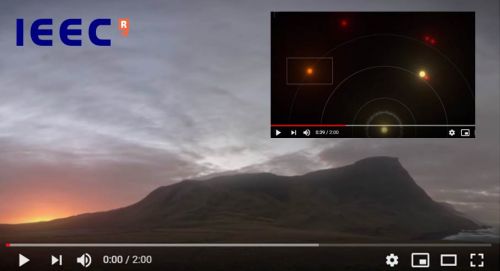
23/11/2018
Astronomers led by IEEC reveal a cold super-Earth around Barnard’s star
Astronomers led by IEEC reveal a cold super-Earth around Barnard’s star
As mentioned last week in our news about the important discovery made by CRAG’s researchers that have obtained plants more resistant to water scarcity, Barcelona Synchrotron Park (BSP) surrounding area is certainly the park’s prime value offered to its companies.
This environment is made of a dense business fabric and the leading research centres of the neighbouring BSP’s Autonomous University of Barcelona (UAB) partner, including CRAG or the Institute of Space Studies of Catalonia (IEEC) from which an international team of astronomers led by Ignasi Ribas of IEEC and Institute of Space Sciences (ICE, CSIC) has found a candidate planet in orbit around Barnard’s star.
Barnard’s star is the closest single star to the Sun and second only to the Alpha Centauri triple stellar system. The team used about 18 years of observations and combined them with new observations with the CARMENES planet-hunter spectrograph at Calar Alto/Spain and other facilities.
Astronomers obtained significant evidence of a planet with mass just over 3 times the Earth’s mass orbiting the red dwarf star every 233 days. This result published last week in the journal Nature would place the super-Earth near the so-called snow-line of the star, where it is likely to be a frozen world.
Video here.
This environment is made of a dense business fabric and the leading research centres of the neighbouring BSP’s Autonomous University of Barcelona (UAB) partner, including CRAG or the Institute of Space Studies of Catalonia (IEEC) from which an international team of astronomers led by Ignasi Ribas of IEEC and Institute of Space Sciences (ICE, CSIC) has found a candidate planet in orbit around Barnard’s star.
Barnard’s star is the closest single star to the Sun and second only to the Alpha Centauri triple stellar system. The team used about 18 years of observations and combined them with new observations with the CARMENES planet-hunter spectrograph at Calar Alto/Spain and other facilities.
Astronomers obtained significant evidence of a planet with mass just over 3 times the Earth’s mass orbiting the red dwarf star every 233 days. This result published last week in the journal Nature would place the super-Earth near the so-called snow-line of the star, where it is likely to be a frozen world.
Video here.
More news
31/03/2016
ICN2 Graphene-Based Sensors for Biomedicine and Brain-Machine Interfaces
21/03/2016
Halal Certification Awarded to Natura Bissé
16/03/2016
SENER is back to Mars
09/03/2016
Barcelona, 2016/17 Top European City for FDI Strategy
03/03/2016
NCD Beamline at ALBA Synchrotron: When X-Rays Make Chocolate Speak
24/02/2016
Barcelona DC Cluster from BSP at the 2016 Mobile World Congress Brokerage Event









